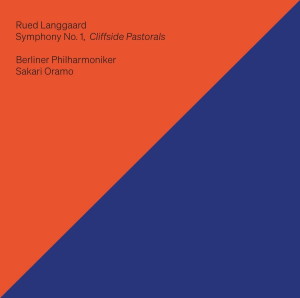
Rued Langgaard (1893-1952)
Symphony No 1, ‘Klippepastoraler’ (Cliffside Pastoral), BVN 32 (1908-1911)
Berliner Philharmoniker/Sakari Oramo
rec. live, 16-18 June 2022, Philharmonie, Berlin
Reviewed as a Studio Master ++ download (24-bit/352.8kHz) from Dacapo Records
First recording of the critical edition by Bendt Viinholt Nielsen (The Rued Langgaard Edition, 2010)
DACAPO 6.220644 SACD [55]
From the beginning, Dacapo have worked tirelessly to promote Danish classical and new music. Indeed, after just 33 years they’ve produced many indispensable recordings, several of which have pride of place in my collection. Starting with Carl Nielsen, notable successes include the symphonies and Maskarade, both conducted by Michael Schønwandt, the Songs for choir – the excellent Ars Nova Copenhagen directed by Michael Bojesen – and The Organ Works, played by Bine Bryndorf. (The latter – especially well recorded, even by the label’s stellar standards – was one of my top picks for 2016.) Then there’s Thomas Dausgaard’s seven-disc survey of The Symphonies and Sfærernes musik (Music of the Spheres) by the indecently talented composer-organist Rued Langgaard. Their contemporary repertoire is equally impressive, The Natural World of Pelle Gudmundsen-Holmgreen an unexpected delight, Per Nørgård‘s ‘outsider’ opera, Der göttliche Tivoli, a tough but rewarding challenge. In every case musical and technical standards are very high indeed.
The Finnish conductor Sakari Oramo is no stranger to Danish music. He and the Royal Stockholm PO have recorded the Nielsen symphonies, a cycle that, despite a disappointing start, went on to become one of the best in the catalogue (BIS). As if that weren’t praise enough, he and the Wiener Philharmoniker went on to give outstanding performances of Nørgård’s Symphonies 1 & 8 and Langgaard’s Symphonies 2 & 6. (These very desirable Dacapo releases were among my top picks for 2014 and 2018, respectively.) The downside here, if there is one, is that any follow-ups will be hard-pressed to compete.
In preparation for this review I revisited two other recordings of Langgaard’s maiden symphony. First up was the Dausgaard/Danish National Symphony Orchestra one, recorded in 2007, contained in the Dacapo box I mentioned earlier. (The performance is also available on a single disc or download: 6.220525.) This remains my go-to version of the piece, although Leif Segerstam’s – recorded with the same forces in 1993 – has risen in my estimation over the years (Chandos CHAN9249). Listening to both releases side by side was most instructive. To begin with, I was reminded what an assured and original work this is; the composer was just 17 when it was completed. I was also struck anew by the bold, authoritative nature of these readings, both conductors securing committed performances from their players. To top it all, the recordings were made in the congenial acoustic of the Danish Radio Concert Hall, Copenhagen.
The USP of this live performance of Langgaard 1 is that it’s the world premiere recording of the new critical edition of the score, which Oramo first conducted with the BBC Symphony on 8 April 2022. As it happens, the original symphony was premiered by Max Fiedler and the Berliner Philharmoniker in 1913, so it seems fitting that the BP should be part of this important event. Oramo and the Berliners’ account of the opening movement ‘Surf and glimpses of sun’, has a Straussian weight and amplitude, the quieter, quasi-Brucknerian passages feelingly done. As expected the recording, made in a packed auditorium, isn’t as spacious or as transparent as Dausgaard’s, the latter recorded in an empty hall under studio conditions. That’s hardly a deal-breaker, although interpretational differences might be. For instance, Oramo opts for a lush, seamless delivery that tends to blunt the music’s edges and flatten its contours. By contrast, his Danish rival takes a more discrete approach, carving the movement into a series of clearly defined paragraphs that helps to create a strong and varied narrative. He also finds many points of tension, some quite precipitous, all of which adds immeasurably to the opener’s air of excitement. And how implacable that long crescendo, a dramatic device that goes almost unnoticed in the Finn’s performance.
Honours are more evenly divided in the ensuing movement, entitled ‘Mountain flowers’. Oramo shades and shapes the music most beautifully, the playing as rich and refined as one might expect from this fabled band. (Dausgaard’s orchestra aren’t far behind, the ‘hear-through’ sound revealing a wealth of inner detail, the gorgeous horns especially well caught.) I’ve no qualms about Oramo’s take on the central movement, ‘Legend’, either. More than that, it’s a reminder – if one were needed – that this young composer was firmly in control of his material. Not precocity or conceit, just raw, unalloyed talent.
The final sections, ‘Mountain ascent’ and ‘Courage’, show Oramo at his best, the orchestra responding to his demands with alacrity and precision. The prospect of reaching the summit seems to galvanise Oramo and his orchestra into action, the playing more focused, more animated than before. But it’s Dausgaard’s consistency of vision – and execution – that makes his reading of the symphony so rewarding. Nevertheless, Oramo and his Berliners deliver a superb finale, where Langgaard out-Strausses Strauss, Dacapo’s Studio Master ++ coping effortlessly with those mighty perorations. The applause has been edited out.
Very good, but not outstanding; the Dausgaard recording remains the benchmark here.
Dan Morgan
Help us financially by purchasing through





















